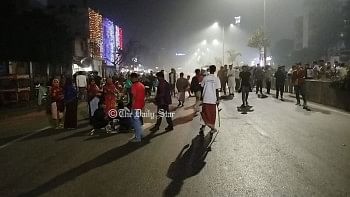'2nd Thai jungle camp holds more bodies'

Villagers may soon lead authorities to another traffickers' jungle camp in southern Thailand holding even more bodies than the 26 uncovered in the first over two days of digging.
Yesterday, Thai authorities found 32 graves suspected to be of trafficked victims from Myanmar and Bangladesh in an abandoned jungle camp.
Twenty-six bodies were found – badly decayed – from shallow graves covered by bamboo and a few feet of dirt. Two were rescued, one of whom was a Bangladeshi.
''There could be more than 50 graves in the second camp, and there are other camps with smaller numbers of buried bodies scattered near the border,'' Phuketwan reports quoting a reliable source.
The bodies are the legacy of years of human trafficking, with local villagers in southern Thailand and along the Andaman coast either benefitting from the horrendous trade in people or turning a blind eye to it.

Authorities wishing to trap the traffickers have seldom had much success because vast networks of helpers always provided warnings when raids were being undertaken.
What the raiders nearly always found in the discarded jungle camps were groups of lame Rohingya and Bangladeshi boatpeople, too sick or injured to travel.
The graves found over the past couple of days on the hillside near Pedang Besar, within 300 metres of the border with Malaysia, are dramatic evidence of the nightmarish existence of the boatpeople, abused in their hundreds to extract ransoms from relatives or friends.
Many more graves exist at hidden camps across the south and north of Phuket along the Andaman coast in Phang Nga and Ranong, where for years boats from Burma (Myanmar) and Bangladesh delivered men, women and children to so-called ''brokers''.
Finally this week, the world's mainstream media began to pay attention because of the number of bodies on the hillside of horror.
Many more are buried, Phuketwan was told today, on other hillsides on the same mountain.
For years Thailand's Immigration Division 6 Commander, Police Major General Thatchai Pitaneelaboot, has been conducting raids on camps that mostly came up empty, except for discarded boatpeople.
The discovery of the large camp, hidden deep in the jungle, came this week with the arrest of a trafficker named Anwar. Anwar is thought to be one of southern Thailand's most significant traffickers.
''The brokers' networks throughout the villages have always acted to warn them of raids in the past,'' Major General Thatchai said. ''But we believe the cycle is reversing now and more people are beginning to understand that trading in people is morally wrong, and abhorrent.''
Even reports in Phuketwan of rapes and murders by traffickers on mangrove-covered islands off Phang Nga or in the jungles along the Thai-Malaysia border have failed to provoke an official reaction.
Now, it seems, the bodies in the jungle are likely to trigger firm action from Bangkok and sway popular opinion in the villages where trafficking has become a lucrative cottage industry.
Drug dealers have converted to ''brokers'' in human beings because the profits were much larger and there were no penalties.

Local police were always reluctant to declare that boatpeople were human trafficking victims, taking instead the easy way out, defining them as illegal immigrants and having them trucked back to the Burma-Thai border.
The tide against trafficking began turning on the ground along the Andaman coast last year, when Manit Pleantong, the district chief of the Takuapa district, north of Phuket, set up a 24-hour human trafficking checkpoint on the main road south.
Authorities now acknowledge that Khun Manit's volunteers have paid a key role in changing the minds of local villagers about trafficking and driving the ''brokers'' to other parts of the Andaman coast.
The mystery is how hundreds of Rohingya and Bangladeshis are trucked from the coast to the jungle camps of southern Thailand without being detected along the way by police or the Army.
Now the concern is growing that pressure being mounted in Thailand against trading in people is forcing the human traffickers to hold their captives in boats at sea.
Just like the camps in the jungle, people in tight spaces on boats inevitably grow weak and die as the days of their confinement stretch into weeks, and months.
Unless family and friends raise the ransom, their fate is likely to be the same as the bodies removed this week from the jungle, except that disposing of bodies at sea is so much easier.


 For all latest news, follow The Daily Star's Google News channel.
For all latest news, follow The Daily Star's Google News channel. 




Comments